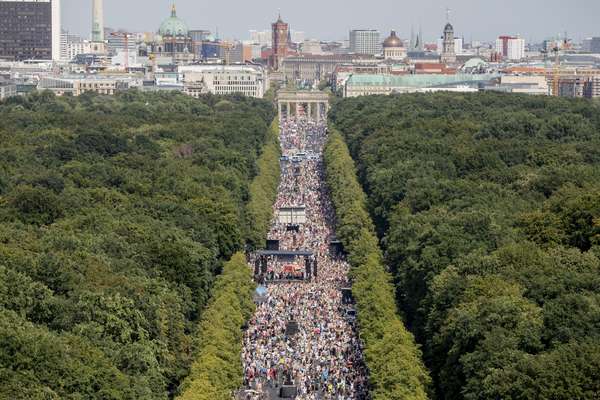Germany, Berlin — On Saturday a large crowd gathers for a “sit-in” at Berlin’s iconic Brandenburg Gate to protest against the German government’s coronavirus restrictions.
The march held previously on Saturday was halted by the organizers as they were criticized by the police for not adhering to rules on social distancing and face masks.
This March included of anti-vaccine groups and some far-right and neo-Nazi organizations and was named as “Day of Freedom — The End of the Pandemic,” by the organizers. “We are the second wave,” yelled some of the protesters on the event.
The Berlin police has said on Twitter that majority of the protesters were not adhering to social distancing rules or wearing masks.
“Our colleagues are using loud speakers to urge the adherence to the rules. We are also documenting non-compliance for possible later prosecution,” Berlin police tweeted. They have also mentioned that a criminal complaint was filed against one of the march’s organizers for not adhering to hygiene rules.
The current Covid-19 guidelines in Germany says that people must maintain a distance of 1.5 meters, or about 5 feet. If it is not possible to maintain the distance people are instructed to wear masks as a precaution.
The police has warned atleast 17,000 protestors in the March that they would only be allowed to participate in the demonstration if they wore face coverings and maintained social distance.
Although the master of ceremonies told the crowd from the stage to maintain physical distance so the authorities wouldn’t get “a pretext” to break the event, the livestream of the protest showed that almost no one was wearing a face mask during the protest.
Germany had previously recorded the highest number of daily cases on May, however the highest number of coronavirus infections in a 24-hour time span in Germany was overtaken on Saturday to 955 infections, according to the data from Germany’s agency for disease control and prevention, Robert Koch Institute.
The institute of Germany says lax enforcement of social distancing and hygiene rules and they are also blaming the travelers returning from abroad for the steep rise in cases.
The economy minister of Germany, Peter Altmaier described this new number as ‘alarming’ in a Twitter post on Saturday.
“Especially since it is not large ‘hot spots’ but smaller clusters of infections. The main risks need to clearly be named so that a more targeted prevention becomes possible,” Altmaier wrote.
According to a new directive from Germany’s health ministry, the travels coming to Germany starting from Saturday will be able to get free coronavirus tests up 72 hours after arrival.





